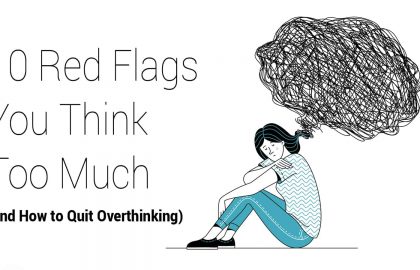Although you may have heard of the term “practicing gratitude,” what does it actually mean? In essence, it is a pathway towards spiritual alignment. One might describe it as moving with life’s current as opposed to against it. For many people, practicing gratitude is a conversation rooted in hyperbole; however, a number of benefits truly come with making it a part of one’s life. In fact, those who have made gratitude/deep appreciation a part of their life have attributed the practice to better sleep, a stronger immune system, and positive emotions. In this article, we will detail five gratitude practices that can positively change your life and how to implement them.
Here are 5 gratitude practices that can change your life:
1. BEING THANKFUL
One of the best ways to experience appreciation is to be mindful of the things you are most grateful for each day. To help make this possible, consider documenting the moments in a gratitude-related journal. This allows you to track spiritual growth and integrate appreciation into your life more and more. That said, every journal entry does not have to be monumental; in fact, small entries denoting your gratitude for life’s small blessing could suffice. For example, you can notate your appreciation for good health, family, and friends.
2. BECOME INTENTIONAL
While it is important to feel excited about the benefits of being deeply appreciative, we don’t want to lose sight of the bigger picture; otherwise, this may adversely affect forward progress. What does this mean, exactly? If getting deep, restorative sleep, for example, is something that you are especially grateful for, you would be doing yourself a disservice by spending countless hours journaling your appreciation. Basically, aim to avoid the things that will impede your ability to be intentional in your practice of appreciation.
In practicing appreciation, keep things in perspective and avoid things that detract from otherwise good experiences. To maximize the benefits of practicing gratitude, also practice mental contrasting, which involves optimism in the face of new habits; this includes noticing the benefits that come with them while remaining consciously aware of how difficult those can be to maintain. For example, if you have quit smoking, the benefit of doing so is good health, which you will undoubtedly appreciate. However, it is equally important to recognize how challenging it can be to remain smoke-free.
3. MAKE GRATITUDE PRACTICES FUN
According to a study conducted by the University of Rochester, inherent motivation plays a critical role in human autonomy. Therefore, if a particular experience does not resonate with you, it is okay to try new things. And yes, this also includes journaling. Basically, practicing appreciation should not feel like a chore but, instead, an opportunity to reflect and give thanks. To help further illustrate this point, whenever you’re experiencing a significant moment of appreciation, consider writing it down on a piece of paper and putting it in a jar. Think of it as a tip jar of appreciation; this can replace writing an entry into your gratitude journal. Needless to say, many people will identify with this concept of making gratitude practices fun.
4. EMBRACE BEING SOCIAL
Remember, our relationship with friends and family can also play a pivotal role in our happiness and sense of self. It stands to reason that we should think of others while we charter our path towards deeper appreciation. In fact, according to Robert Emmons, an expert on gratitude-related topics and Professor of Psychology at UC Davis, projecting our appreciation on those who we are thankful to have in our lives supersedes feelings of appreciation that come from circumstances or anything material.
You may consider it worth it to expand your social circle; this will make more room to express your appreciation for others. Also, if you’re a fan of chronicling meaningful moments, consider writing letters to those who you believe have made significant contributions to your life. Think of those whom you have never taken the time to officially thank. Although this may seem out of character for you, it will pay off in more ways than one.
5. ACKNOWLEDGING YOUR GIFTS
One of the easiest gratitude practices anyone can implement is viewing all of the things we take for granted as life’s gifts. What does this mean, exactly? Well, it can be as simple as appreciating someone else’s laugh or being thankful for your morning cup of coffee while heading to work. In our daily lives, it is easy to only focus on the bigger picture; however, in doing so, we often lose sight of the smaller things that are equally important.
UNDERSTANDING GRATITUDE PRACTICES
Studies have shown a link between appreciation, mental health, and overall life satisfaction. To help better contextualize this statement, we need only look at how happy people become when they feel protected from negativity like bitterness, jealousy, and other damaging emotions. Scientific data also shows a correlation between good gratitude practices and reduced feelings of anxiety and depression; the same data indicates that such practices can help those struggling with addiction as well. That said, the act of showing appreciation, being mindful, and giving thanks is far more than hyperbole; it is backed by science.
In addition to improving one’s mental health and stifling negative emotions, the act of giving thanks and showing appreciation goes a long way toward reducing stress. Also, the ability to recover from illnesses is markedly improved. In fact, many have attributed good gratitude practices with lowering their blood pressure and giving their immune function a much-needed boost.
REACHING MORE PEOPLE THROUGH GENUINE APPRECIATION
The best thing about showing appreciation is that the act extends beyond the individual who happens to be experiencing it. Instead, it is something that gets catapulted into the ether and touches everyone that you come in contact with. True acts of appreciation often lead to a reciprocal response, meaning those who have experienced it are more likely to respond in kind. Beyond that, those who are grateful are usually held in high regard, often looked upon as being optimistic, trustworthy, and more social than those who are not.
As far as the origin of gratitude practices is concerned, they have been linked to religion and different forms of spirituality for centuries, especially among the following religions:
- Buddhism
- Hinduism
- Christianity
- Islam
It should be noted that appreciation, mindfulness, and overall spirituality are the primary tenets of these religions throughout the world.
APPRECIATION AND BEING IN THE MOMENT
Unlike negative emotions, positive emotions are often short-lived. Our minds have a tendency to embrace “newness” as a novelty item. This is to say that the euphoria that accompanies new experiences like purchasing a new home or car, for example, will fail to excite us after we have had them for a few years. True appreciation, on the other hand, provides boundless satisfaction and is far more enduring. What is the difference between the two, you ask? Well, deep appreciation allows us to fully appreciate the value in things; by doing so, we attach truly meaningful benefits to them. Also, we are less likely to take those things for granted.
For many people, the ability to express deep appreciation allows them to actively participate in life as opposed to merely going through the motions. Basically, being appreciative encourages us to slow down and enjoy the positive aspects of our lives as opposed to dwelling on the negatives. In some cases, deeper appreciation can also help us detach from the digital world. After all, those who are focused on being in the moment and witnessing the joys of life are less concerned with social media platforms that encourage us to live vicariously through others while we deprive ourselves of seeking our own paths to joy and fulfillment.
GAINING SELF-WORTH THROUGH APPRECIATION
As we round out this article, this would be an opportune time to mention that the act of being truly appreciative can translate to feeling better about one’s self. As you become more cognizant of the things other people do for you, as well as recognize life’s little blessings, you begin to see yourself in a different light. For many people, this evokes a feeling of higher self-worth.
CONCLUSION
In summation, there are a number of benefits that come with being truly appreciative, mindful, and living in the moment. Although these concepts may sound strange if you have never applied them to your life, the physical and psychological benefits that come with such practices are undeniable.
The post 5 Simple Gratitude Practices that Will Change Your Life appeared first on Power of Positivity: Positive Thinking & Attitude.
Source – powerofpositivity.com






